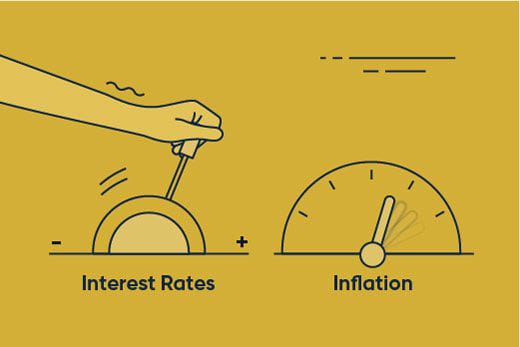Inflation and interest rates are two critical economic indicators that directly influence the stock market. For investors and traders, understanding how inflation and interest rates interact is essential for making informed decisions. In 2024, both inflation and interest rates have garnered significant attention as central banks around the world adjust their policies to combat economic uncertainties.
Here’s a detailed look at how inflation and interest rates shape stock market behavior and stock trading, along with practical strategies for navigating these conditions.
Inflation: What It Means for Stock Markets
Inflation refers to the general increase in prices over time, reducing the purchasing power of money. While moderate inflation is a sign of a growing economy, rapid inflation can disrupt financial markets and hurt investor sentiment. This section explores how inflation affects stock markets and investor sentiment.
Key Ways Inflation Affects Stock Markets
Erosion of Purchasing Power
Inflation decreases the value of money, which means the price of goods and services increases, and consumers and businesses can buy less with the same amount. For companies, this can result in higher costs for materials, labor, and other operational expenses. These increased costs reduce profit margins, which in turn can hurt stock prices. Investors might react by selling off shares of companies that are particularly sensitive to rising costs, such as retailers or manufacturers.
Consumer Spending and Demand
To understand how does inflation affect consumer spending, it’s important to note that higher inflation often results in lower consumer spending. When goods and services become more expensive, consumers might cut back on non-essential purchases, affecting the revenue of companies dependent on consumer spending. This can lead to lower earnings for those companies, negatively impacting their stock performance.
Uncertainty in Future Earnings
Inflation introduces uncertainty in future earnings forecasts. When inflation rates are high, it becomes more challenging for analysts and companies to project future revenue and costs accurately. This uncertainty often leads to increased volatility in the stock market, as traders adjust their positions based on changing inflation expectations.
Sector-Specific Impact
Not all sectors react the same way to inflation. Sectors like utilities and consumer staples tend to be more resilient because they provide essential goods and services that remain in demand regardless of price increases. On the other hand, growth sectors like technology and luxury goods often suffer during inflationary periods, as consumers prioritize essentials over discretionary spending.
Interest Rates: Their Role in Stock Trading
Interest rates are the cost of borrowing money, set by central banks like the Federal Reserve. They are one of the key tools used to control inflation and stimulate or cool down the economy. Changes in interest rates have immediate and far-reaching effects on stock markets.
How Interest Rates Affect Stocks
Cost of Borrowing
When central banks raise interest rates, borrowing becomes more expensive for companies. Higher borrowing costs can reduce corporate profits, as companies have to pay more in interest for loans used to fund expansions, acquisitions, or other investments. This can lead to reduced earnings and lower stock prices, especially in sectors that rely heavily on debt financing.
Valuation Adjustments
Interest rates also influence stock valuations. The value of a stock is often based on the present value of its future cash flows. When interest rates rise, the discount rate used in these calculations increases, making future cash flows less valuable in today’s terms. This tends to lower stock prices, particularly for high-growth companies whose valuations are based on expectations of substantial future earnings.
Investor Preferences
Higher interest rates can lead to a shift in investor preferences. As interest rates rise, fixed-income investments like bonds become more attractive, offering better returns with lower risk compared to stocks. This can lead to a sell-off in equities, particularly in growth stocks, as investors move their capital to safer, interest-bearing assets.
Impact on Consumer Spending
Interest rate hikes also affect consumer spending by making loans and mortgages more expensive. As a result, consumers might reduce their discretionary spending, impacting businesses that depend on high consumer demand. Lower consumer spending can hurt the revenue and earnings of companies in sectors like retail, travel, and hospitality, further weighing on their stock performance.
Combined Effect of Inflation and Interest Rates on Stock Markets
Inflation and interest rates often interact in ways that compound their effects on the stock market. For example, when inflation rises, central banks typically respond by increasing interest rates to prevent the economy from overheating. This combination of rising inflation and higher interest rates can have a profound effect on stock market behavior.
1. Investor Sentiment and Volatility
Both inflation and interest rates are key drivers of investor sentiment. When inflation is high, and interest rates are rising, investor confidence tends to waver, leading to more volatile trading. Traders might exit positions in riskier stocks and seek shelter in assets that perform better in such conditions, like commodities or inflation-protected bonds.
2. Earnings Growth Pressure
Companies often face a squeeze on earnings when both inflation and interest rates rise. Higher input costs due to inflation, combined with increased financing costs from higher interest rates, can severely impact corporate profitability. This creates a negative feedback loop for stocks, especially in capital-intensive industries like real estate, construction, and manufacturing.
3. Sector Rotation
Investors often rotate between sectors based on the inflation and interest rate environment. During periods of high inflation and rising interest rates, defensive sectors like healthcare, utilities, and consumer staples typically outperform, as they provide essential products and services that remain in demand. Conversely, growth sectors such as technology or financials may see underperformance.
Strategies for Trading in a High Inflation and High Interest Rate Environment
Navigating stock markets during periods of inflation and rising interest rates requires a strategic approach. Below are some tactics traders and investors can use to protect their portfolios or capitalize on market opportunities:
- Focus on Defensive Stocks
Defensive sectors such as utilities, healthcare, and consumer staples tend to perform better during periods of high inflation and rising interest rates. These companies provide essential goods and services, which tend to maintain demand regardless of economic conditions. - Consider Dividend-Paying Stocks
Dividend-paying stocks can be a good hedge against inflation. Companies with a strong track record of paying dividends provide a steady income stream, which can help offset the erosion of purchasing power caused by inflation. High-dividend sectors like utilities and consumer staples are worth considering. - Watch for Opportunities in Financial Stocks
Financial stocks, particularly banks, can benefit from rising interest rates. Higher rates often lead to increased profit margins for banks, which can charge more for loans. However, the effect of inflation on financial stocks should be carefully monitored, as it can also reduce consumer and business demand for borrowing. - Use Inflation-Protected Securities
Inflation-protected securities, such as Treasury Inflation-Protected Securities (TIPS), offer a way to guard against inflation risk. These bonds adjust their principal value based on inflation rates, providing a hedge against rising prices while offering a lower-risk investment option. - Stay Informed on Central Bank Policies
Central bank announcements on interest rates and inflation control measures can cause significant market movements. Staying updated on central bank policies, particularly from institutions like the Federal Reserve, is crucial for making timely investment decisions.
Conclusion: Managing Inflation and Interest Rate Risks in Stock Trading
Inflation and interest rates are major forces that influence stock market movements. High inflation tends to hurt corporate profits and reduce consumer spending, while rising interest rates increase borrowing costs and can shift investor preferences toward safer assets. Understanding these dynamics and how they interact is critical for traders and investors.
By focusing on defensive stocks, dividend payers, and financials, and keeping an eye on central bank policies, traders can better manage the risks and opportunities that arise in environments characterized by inflation and interest rate hikes.





